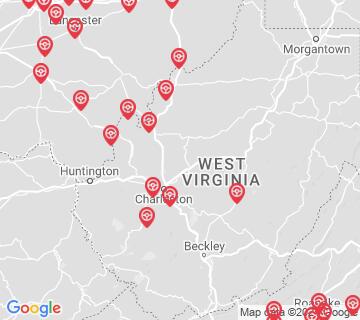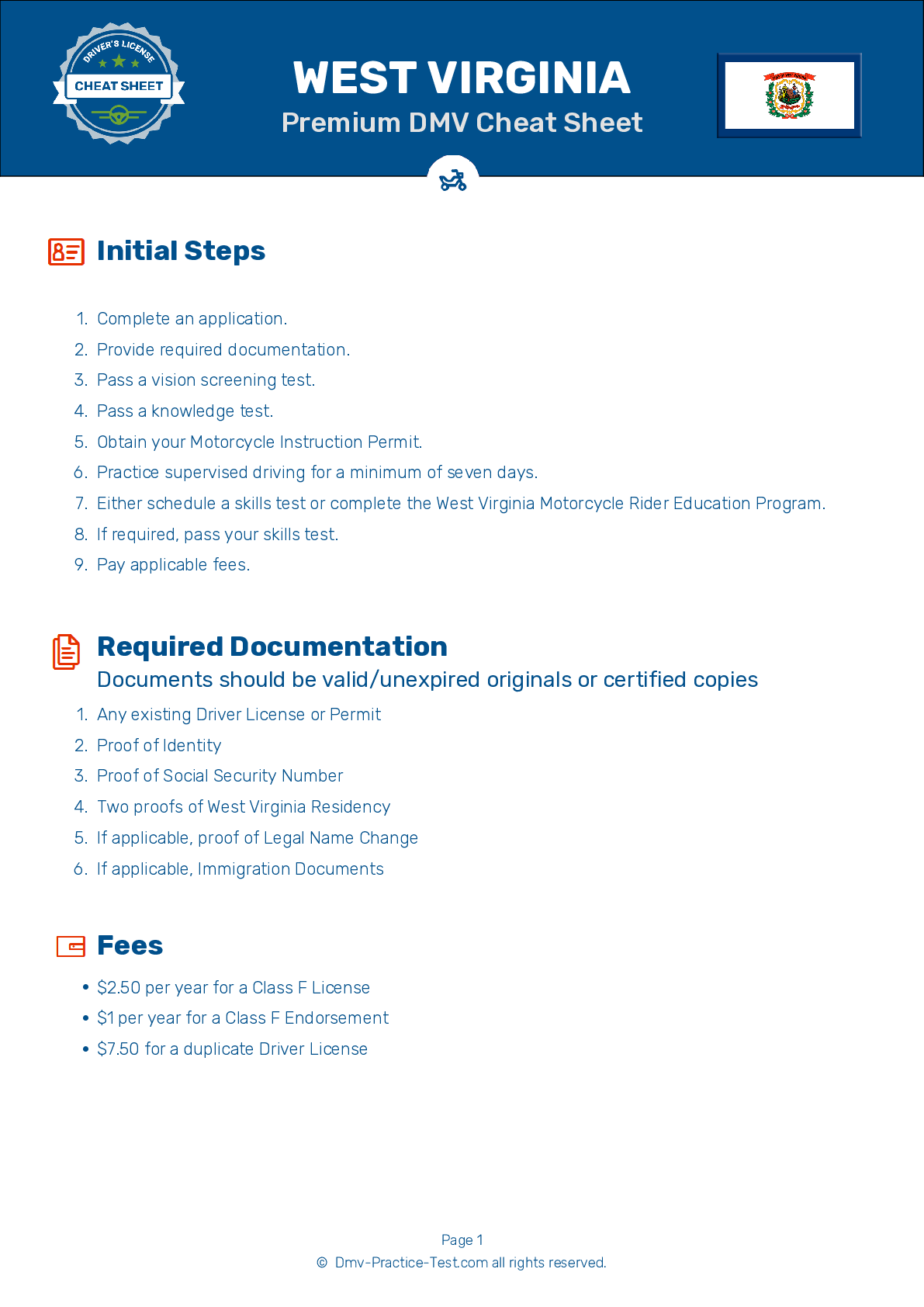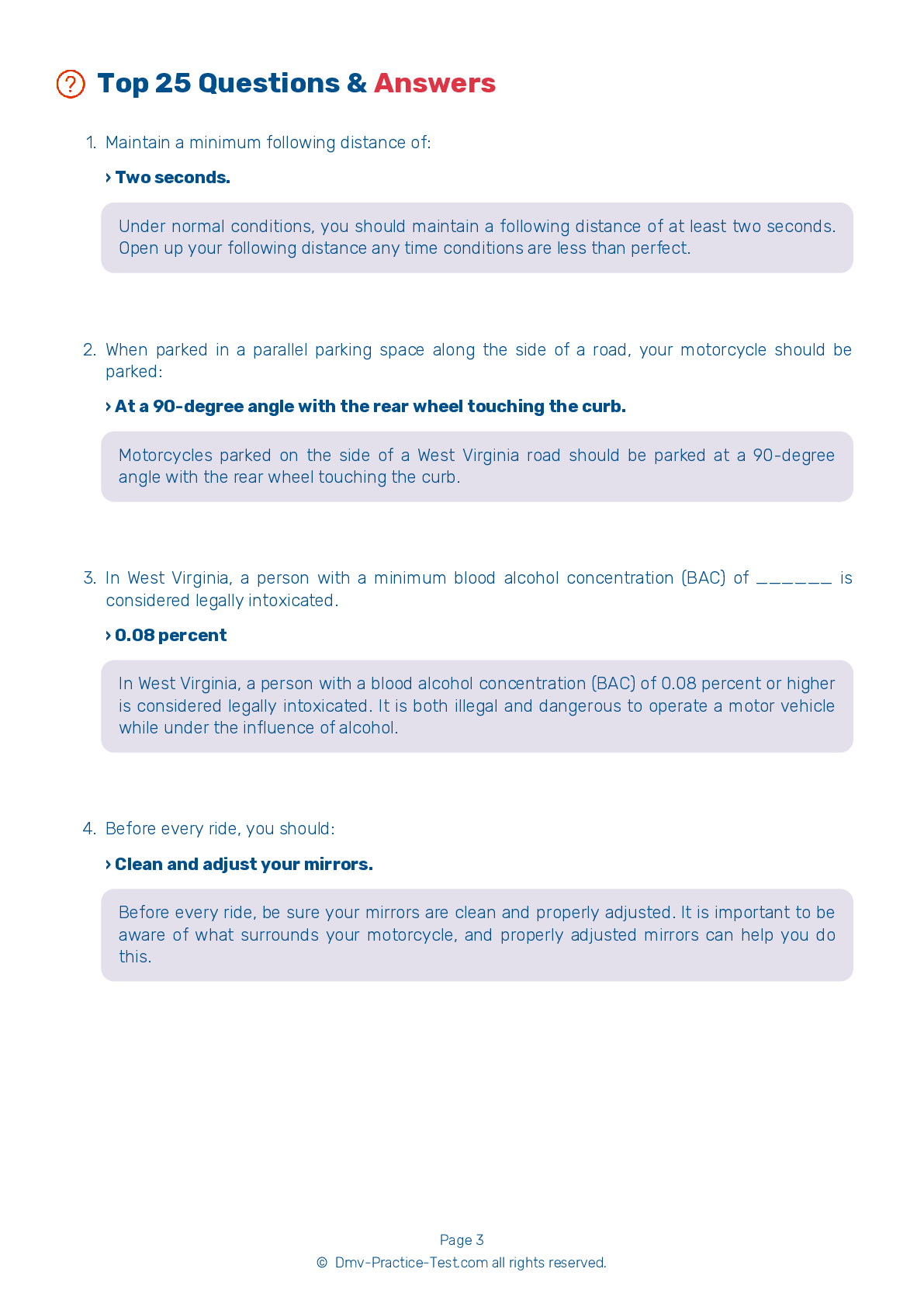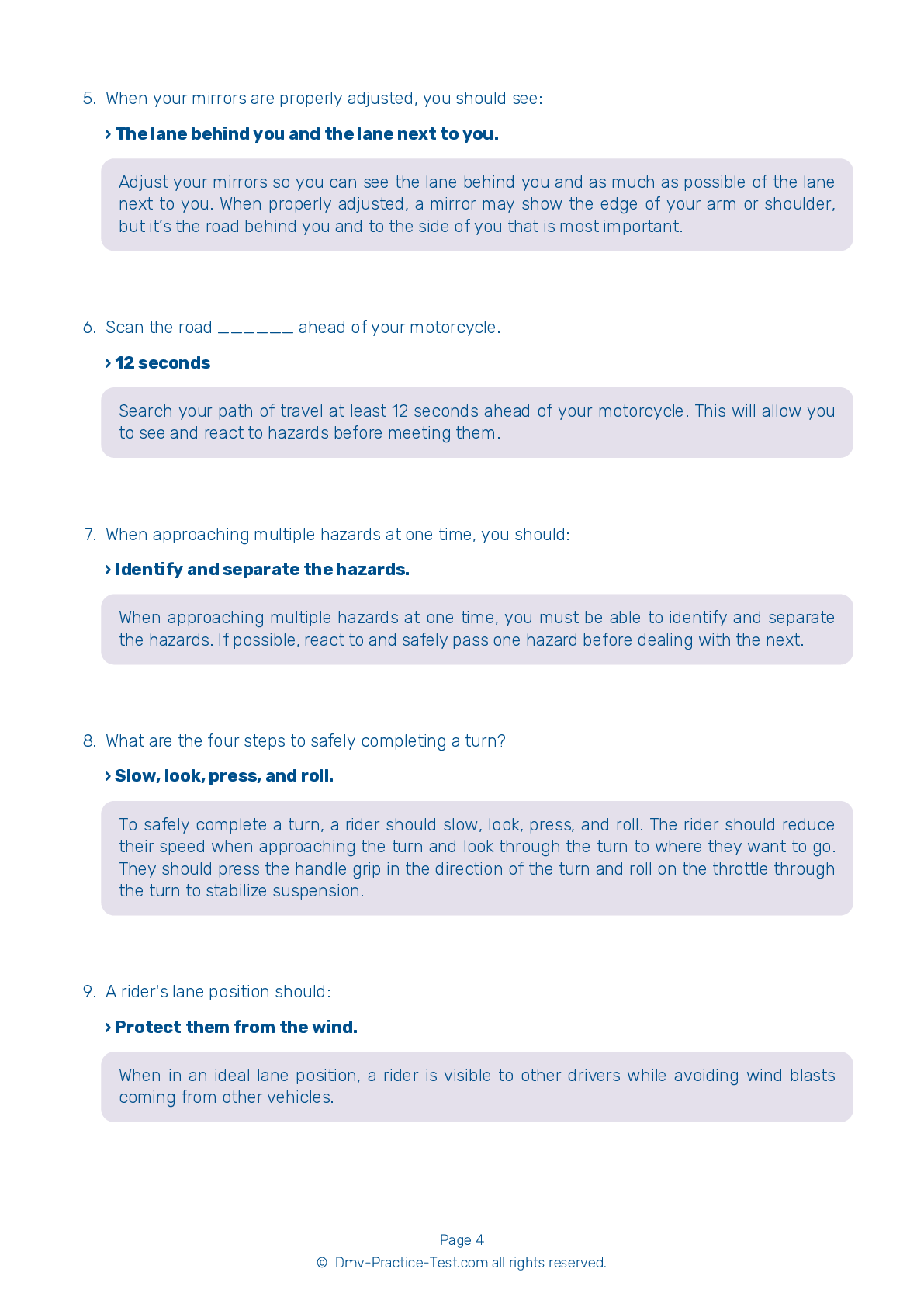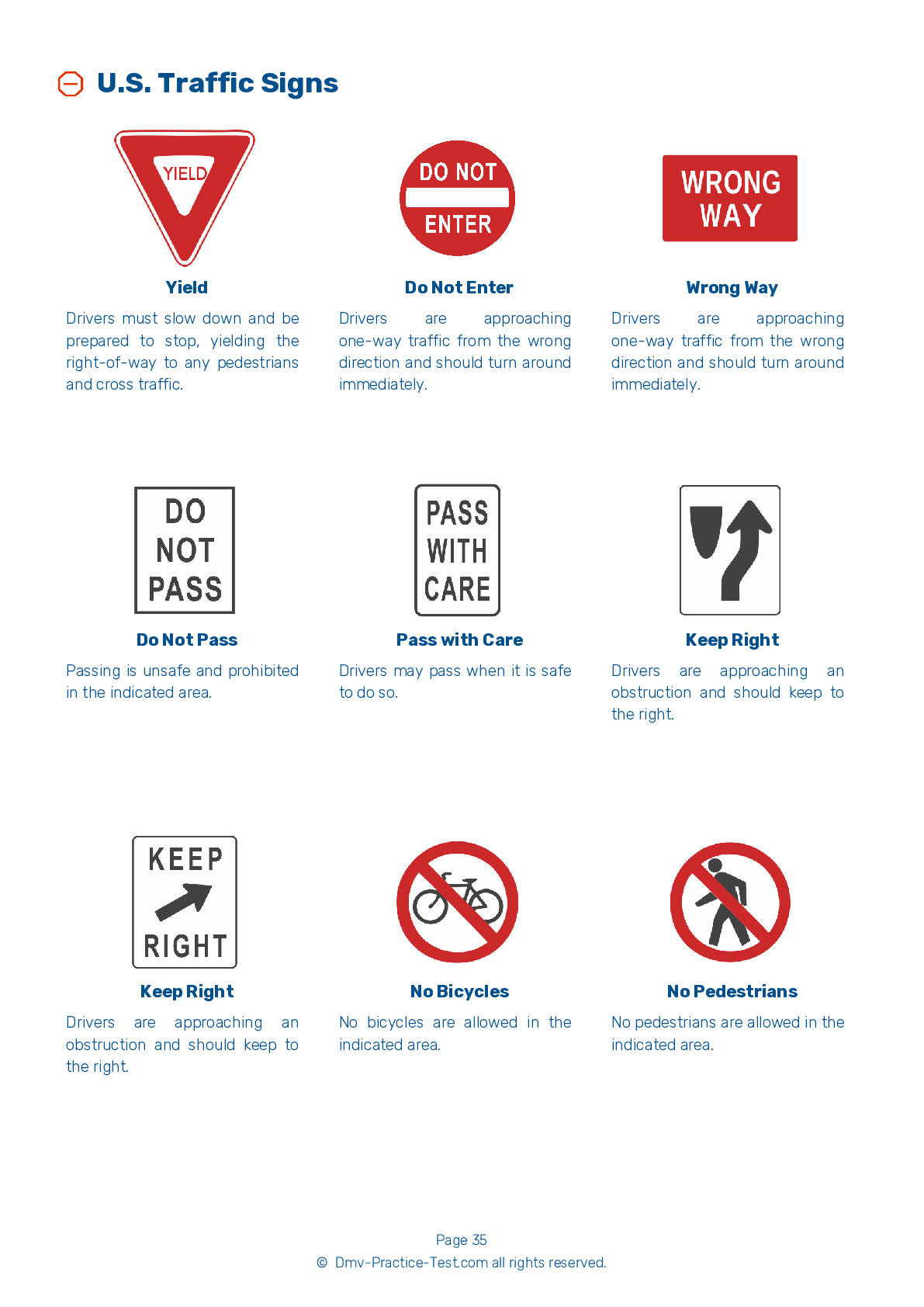DMV Permit Test #1
Motorcycle Test | License WV 2026 | FREE Online Practice! #1 Page 3 of 4
Take this FREE motorcycle test (license in WV 2026) to check your knowledge of the road rules. To improve your results, download a motorcycle handbook online, study theory, and practice for free on our website. Still worried about how to get a motorcycle license in West Virginia in 2026? Check our website for more sample tests, train as much as possible, and boost your grades!
25
19
16
13 . If you are riding directly alongside a vehicle:
Any wind will be blocked, making it easier to ride.
Riding directly alongside another vehicle is dangerous. You may be in its blind spot, and the driver could enter your lane without realizing you are there. Additionally, the vehicle may block your escape route in the event of an emergency.
14 . A motorcyclist can discourage other vehicles from lane sharing by:
Riding in a zigzag pattern to fill up a lane.
Any time a driver may be tempted to try to squeeze into your lane next to you, ride in the center portion of the lane to discourage them from doing so.
15 . For the best protection, jackets and pants:
Should be made of wool.
To provide adequate protection when riding, jackets and pants should cover your arms and legs completely. Your clothing should fit snugly but be loose enough to let you move freely. Leather or newer kinds of synthetic materials provide the best protection in the case of an accident.
16 . If attempting to brake in a curve, you should:
Only use the rear brake.
Because tires have less traction when a motorcycle is leaning than when it is upright, always try to position your motorcycle in an upright position before braking. If you must brake while in a curve, apply the brakes more smoothly and gradually than if your motorcycle was traveling on a straightaway.
17 . When making a turn:
Stopping should never be attempted.
It is possible to brake while turning, but it should be done with great care. When a motorcycle is leaning to turn, there is less traction available for stopping because some of the traction is being used for turning.
18 . When you have mounted your motorcycle, you should do all of the following, except:
Make sure the clutch works smoothly.
After mounting your motorcycle, you should make sure the clutch, throttle, horn, and brakes all work properly. Clean and adjust the mirrors and make sure that the fuel supply valve is open.
Search the best driving school in your neighbourhood
2026 West Virginia | Frequently Asked Questions
In West Virginia, you can acquire a motorcycle license by first obtaining a motorcycle learner's permit. To get this, you must pass a written knowledge test. After holding the permit for at least 30 days and practicing supervised riding, you can then take the skills test to get your full motorcycle license.
In West Virginia, the minimum age to obtain a motorcycle license is 16. However, if you're under 18, you must first obtain a motorcycle instruction permit and complete a state-approved motorcycle safety education course. Additionally, all applicants under 18 must have parental consent to get a motorcycle license.
Yes, in West Virginia, you need a dedicated license to legally operate a motorcycle. This can be a motorcycle-only license, or a motorcycle endorsement added to your regular driver's license. To obtain this, you must pass both a written knowledge test and a skills test. If you're under 18, you'll also need to complete a motorcycle safety course.
To apply for a motorcycle driver's license in West Virginia, you need a completed Application for a Driver’s License or Photo ID Card (Form DMV-DS-23P), proof of identity, proof of Social Security number, proof of West Virginia residency, and proof of legal presence in the U.S. If you're under 18, parental consent is also required.
Yes, you will need to take a written exam for a motorcycle license in West Virginia. The test covers topics such as motorcycle laws, safety rules, and road signs. It assesses your knowledge of operating a motorcycle and understanding of West Virginia's traffic laws. However, completing a state-approved motorcycle safety course can waive this requirement.
The motorcycle written test in West Virginia covers a variety of subjects related to motorcycle safety and operation. These include understanding traffic signs and signals, rules of the road, safe riding techniques, handling hazardous conditions, and motorcycle maintenance. The test is designed to ensure you have the knowledge necessary to operate a motorcycle safely.
Yes, in West Virginia, successful completion of a Motorcycle Safety Foundation (MSF) Basic Rider Course can substitute the written and skills tests required for a motorcycle endorsement or license. After completing the course, you will receive a completion card which you can present at the DMV as proof of your training.
In West Virginia, you can enroll in a motorcycle training course through the Motorcycle Safety Program. You'll need to fill out an application and pay a fee. The course includes classroom instruction and practical riding exercises. Upon completion, you may be exempt from the skills test for your motorcycle license. It's recommended to register early as classes fill up quickly.
No, you don't have to own a motorcycle to take the license test in West Virginia. You can use any motorcycle that is insured, registered, and meets safety standards. However, you must be familiar with the motorcycle's operation. It's also crucial to ensure the motorcycle is appropriate for your size and skill level.
Yes, in West Virginia, you are allowed to use a friend's motorcycle for your driver's license evaluation. However, the motorcycle must be legally registered, insured, and meet all safety requirements. It's also important to ensure you are comfortable and familiar with the motorcycle's operation before your test.
Yes, in West Virginia, the motorcycle driving exam tests specific handling skills. These include left and right turns, sudden stops, swerving or avoiding hazards, riding over obstacles, U-turns, quick deceleration and acceleration, and maintaining control during low speed maneuvers. The test ensures that riders can safely operate a motorcycle under various road conditions.
Yes, in West Virginia, new motorcycle drivers who hold a motorcycle instruction permit are subject to certain limitations. They cannot ride after dark, carry passengers, or ride on the interstate. These restrictions are lifted once the driver passes the motorcycle rider skills test and obtains a full motorcycle endorsement or license.
Yes, your West Virginia motorcycle license or endorsement is valid throughout the United States. However, when you're in another state, you must abide by that state's traffic laws and regulations. It's important to familiarize yourself with these rules before you travel to ensure you're riding legally and safely.
Yes, in West Virginia, it's mandatory for all motorcycle riders and passengers to wear a helmet that meets the safety standards set by the U.S. Department of Transportation. This law applies regardless of the rider's age or experience level. It's part of the state's efforts to promote road safety.
Yes, in West Virginia, you can apply for a motorcycle-only license or a motorcycle endorsement that you can add to your existing driver's license. A motorcycle-only license is for those who only want to ride motorcycles, while a motorcycle endorsement allows you to drive both a car and a motorcycle with the same license.
Yes, in West Virginia, you can add supplementary endorsements to your motorcycle license. These could include endorsements for commercial driving, school bus driving, or hazardous materials transport. Each endorsement requires passing a separate knowledge and skills test. Contact your local DMV office for detailed information about the process and requirements.
Yes, the West Virginia DMV offers the motorcycle license written test in several languages other than English. To ensure your preferred language is available, it's advised to contact your local DMV office ahead of time. However, keep in mind that the road signs and signals are in English, so you must understand them to drive safely.
An effective strategy for preparing for the motorcycle license test in West Virginia is to study the state's Motorcycle Operator Manual thoroughly. This manual covers all the information you'll need for the test. Additionally, taking online practice tests can be very helpful as they simulate the actual test environment and cover similar questions.
Yes, the West Virginia DMV offers the motorcycle written exam in several languages other than English. However, it's advisable to contact your local DMV office beforehand to confirm the availability of the test in your preferred language. This helps ensure they can accommodate your needs when you arrive to take the exam.
Yes, retaking is allowed if you don't pass the motorcycle written test in West Virginia. You must wait at least a day before retaking the test. However, if you fail the test four times, you will have to wait six months before you can retake it. It's recommended to study the motorcycle handbook thoroughly before attempting the test again.
